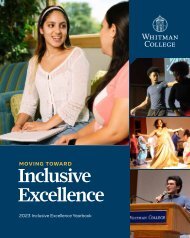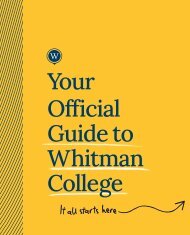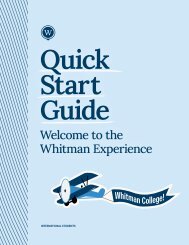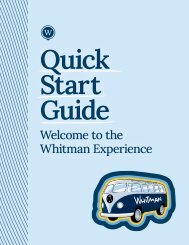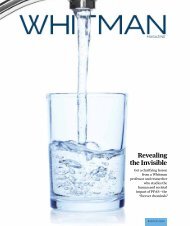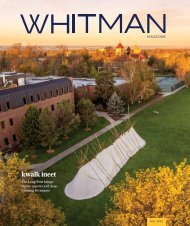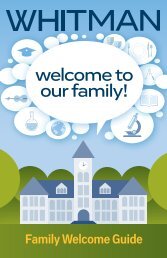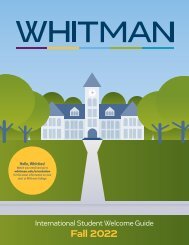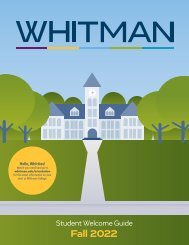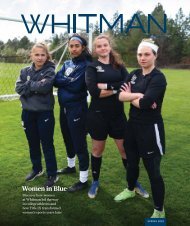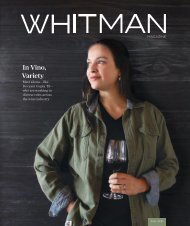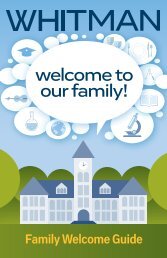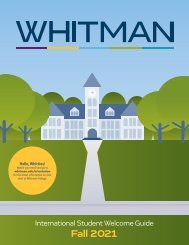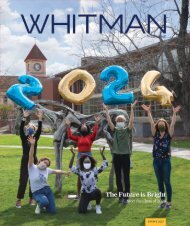You also want an ePaper? Increase the reach of your titles
YUMPU automatically turns print PDFs into web optimized ePapers that Google loves.
“No place is without<br />
a human narrative<br />
about its past.”<br />
— Eunice Blavascunas, from her book<br />
Foresters, Borders, and Bark Beetles:<br />
The Future of Europe’s Last Primeval Forest<br />
Mellon Foundation grant. Phil Brick,<br />
<strong>Whitman</strong>’s Miles C. Moore Professor<br />
of Political Science, and Stan Thayne, a<br />
visiting assistant professor of anthropology<br />
and religion, will join Blavascunas in<br />
teaching the course.<br />
Students will meet with community<br />
partners, including Indigenous, Black<br />
and Latinx leaders who are doing on-theground<br />
work related to climate and<br />
racial justice. The students will create<br />
podcasts from their conversations, which<br />
Blavascunas says will allow them to learn<br />
to deeply listen to people’s stories and<br />
meaningfully retell them with consideration<br />
for who the stories belong to.<br />
In the process, they’ll explore how what<br />
they learn could transform the region into<br />
the ‘Next West,’ a place that remembers its<br />
past, for better or worse, while imagining a<br />
just future.<br />
In Joseph, for example, they will learn<br />
about the town’s namesake, Chief Joseph,<br />
and the Nez Perce Wallowa Homeland<br />
project’s efforts to return land to the tribe.<br />
They’ll also be collaborating with Gwen<br />
Trice, founder of the Maxville Heritage<br />
Interpretive Center, which tells the stories<br />
of African American families who lived in<br />
Maxville—once a 1920s and ’30s timber<br />
town, now a ghost town.<br />
“I see my role in this course not in the<br />
traditional professorial sense of I am using<br />
my expertise on a subject matter, but rather<br />
as an animator and a facilitator between<br />
students and community partners, community<br />
partners who are doing the grounded<br />
and challenging work of being people of<br />
color and living in majority white rural<br />
areas,” Blavascunas says.<br />
FORGING AHEAD<br />
Though her field course will focus on the<br />
Pacific Northwest, Blavascunas’ research<br />
remains unbounded by region or discipline.<br />
She’s exploring topics such as the<br />
effects of “rewilding” animals in Europe<br />
and in North America, the impacts of a<br />
dredging project near Chernobyl, and<br />
how people across the globe think about<br />
the movements of wild animals and their<br />
kinship to them.<br />
Blavascunas seeks to reach beyond an<br />
audience of scholars and show people—<br />
whether in an ancient Polish forest, the<br />
mountains of the Inland Northwest or the<br />
campus of <strong>Whitman</strong> <strong>College</strong>—that another<br />
world is possible.<br />
Matters of<br />
the place.<br />
Eunice<br />
Blavascunas<br />
helps her<br />
students<br />
explore issues<br />
related to<br />
environmental<br />
and racial<br />
justice.<br />
KIM FETROW ’96 OF KIM FETROW PHOTOGRAPHY<br />
WINTER <strong>2022</strong> / 15



